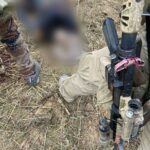
Iraqi Air Force F-16 Fighting Falcons conduct a training mission over Iraq May 26, 2019. (U.S. Air Force photo by Master Sgt. Russ Scalf)
On November 11, F-16 fighter jets of the Iraqi Air Force (IQAF) carried out three airstrikes on a cell of ISIS terrorists in the northern province of Kirkuk.
The terrorists were moving near the town of Bier Ahmad when they were struck. In a statement, the Iraqi Security Media Cell said that the pinpoint airstrikes were coordinated with the National Intelligence Service and the Counter-Terrorism Service.
A day after the airstrikes, a joint force of the Iraqi military and intelligence conducted a search operation in the outskirts of Bier Ahmad. The dead bodies of five terrorists who were killed in the airstrikes were found along with some weapons and communication equipment.
- Click to see full-size image. Via Twitter.
- Click to see full-size image. Via Twitter.
- Click to see full-size image. Via Twitter.
- Click to see full-size image. Via Twitter.
- Click to see full-size image. Via Twitter.
- Click to see full-size image. Via Twitter.
ISIS cells were very active in Kirkuk earlier this year. Nevertheless, recent military and security operations in the province forced the terrorists to lay low, at least temporarily. The group’s news agency, Amaq, has not announced any attack on civilians or government forces in Kirkuk since the start of November.
In other parts of Iraq’s northern region, like the provinces of Nineveh and Saladin, ISIS cells appear to be more active nowadays.
The IQAF played a key role in most recent military and security operations in Iraq. The air force inflicted some heavy losses on ISIS cells across the country, demonstrating its ability operate on its own without any support from the U.S.-led coalition.











